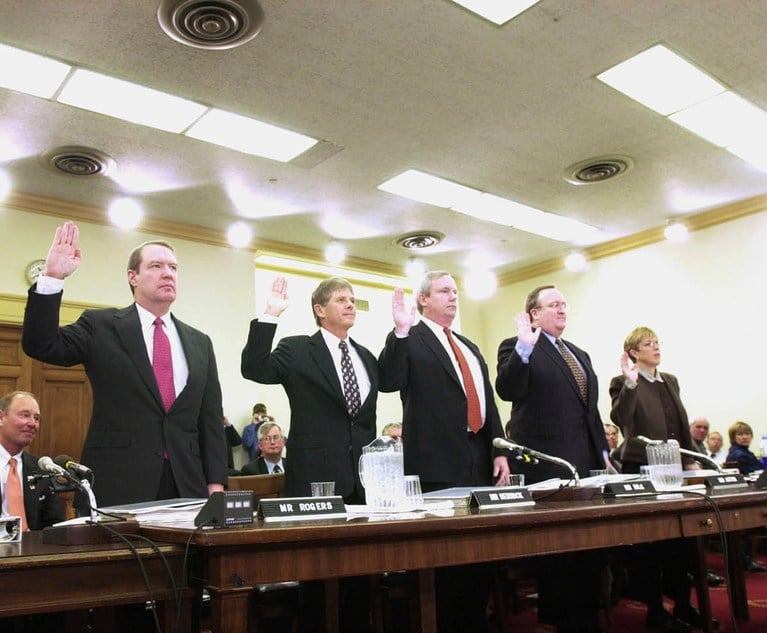 Enron lawyers get sworn in during a hearing on March 15, 2002. Photo: Stacey Cramp/ALM
Enron lawyers get sworn in during a hearing on March 15, 2002. Photo: Stacey Cramp/ALM Enron's Porcelain Anniversary: Governance and Compliance Lessons 20 Years Later
"The lessons of Enron continue to be relevant today given the numerous corporate scandals over the last two decades that echoed many of Enron's governance and compliance failures," say Paige Holden Montgomery and David A. Silva, members of Sidley's white-collar: government litigation and investigations practice.
March 18, 2022 at 07:46 PM
8 minute read
Cases and CourtsAlthough you would be hard-pressed to find an adult today who has not at least heard of Enron Corp.'s collapse in 2001, decades of attorneys have passed through law school and into practice since its demise. Many of those have only a limited appreciation for the truly fundamental role that Enron played in reshaping the landscape of corporate governance and compliance. Instead, to the extent Enron is remembered in the collective conscience, it is usually in the context of some of the scandal's most headline-grabbing aspects: being, at the time, the largest bankruptcy in history; causing the implosion of Arthur Anderson (and thus turning the "Big Five" accounting firms into the "Big Four"); and resulting in the criminal indictment and incarceration of a number of Enron executives.
The most fundamental—or at least, most publicly recognized—reaction to Enron was the passage of the Sarbanes–Oxley Act of 2002 (SOX). Describing Enron's accounting practices as a "canary in the mineshaft," Sen. Paul Sarbanes noted that the company's "convoluted and often fraudulent accounting devices" were used "to inflate earnings, hide losses, and drive up their stock prices." Enron's subsequent collapse directly led to the bipartisan development of SOX's heightened financial and disclosure controls. Moreover, over the course of the ensuing 20 years, the corporate governance guidelines embedded within SOX's provisions have become "best practices" for both public and private companies.
This content has been archived. It is available through our partners, LexisNexis® and Bloomberg Law.
To view this content, please continue to their sites.
Not a Lexis Subscriber?
Subscribe Now
Not a Bloomberg Law Subscriber?
Subscribe Now
NOT FOR REPRINT
© 2025 ALM Global, LLC, All Rights Reserved. Request academic re-use from www.copyright.com. All other uses, submit a request to [email protected]. For more information visit Asset & Logo Licensing.
You Might Like
View All
5th Circuit Strikes Down Law Barring Handgun Sales to Adults Under 21


Read the Document: DOJ Releases Ex-Special Counsel's Report Explaining Trump Prosecutions
3 minute read
Special Counsel Jack Smith Prepares Final Report as Trump Opposes Its Release
4 minute readLaw Firms Mentioned
Trending Stories
- 1Thursday Newspaper
- 2Public Notices/Calendars
- 3Judicial Ethics Opinion 24-117
- 4Rejuvenation of a Sharp Employer Non-Compete Tool: Delaware Supreme Court Reinvigorates the Employee Choice Doctrine
- 5Mastering Litigation in New York’s Commercial Division Part V, Leave It to the Experts: Expert Discovery in the New York Commercial Division
Who Got The Work
J. Brugh Lower of Gibbons has entered an appearance for industrial equipment supplier Devco Corporation in a pending trademark infringement lawsuit. The suit, accusing the defendant of selling knock-off Graco products, was filed Dec. 18 in New Jersey District Court by Rivkin Radler on behalf of Graco Inc. and Graco Minnesota. The case, assigned to U.S. District Judge Zahid N. Quraishi, is 3:24-cv-11294, Graco Inc. et al v. Devco Corporation.
Who Got The Work
Rebecca Maller-Stein and Kent A. Yalowitz of Arnold & Porter Kaye Scholer have entered their appearances for Hanaco Venture Capital and its executives, Lior Prosor and David Frankel, in a pending securities lawsuit. The action, filed on Dec. 24 in New York Southern District Court by Zell, Aron & Co. on behalf of Goldeneye Advisors, accuses the defendants of negligently and fraudulently managing the plaintiff's $1 million investment. The case, assigned to U.S. District Judge Vernon S. Broderick, is 1:24-cv-09918, Goldeneye Advisors, LLC v. Hanaco Venture Capital, Ltd. et al.
Who Got The Work
Attorneys from A&O Shearman has stepped in as defense counsel for Toronto-Dominion Bank and other defendants in a pending securities class action. The suit, filed Dec. 11 in New York Southern District Court by Bleichmar Fonti & Auld, accuses the defendants of concealing the bank's 'pervasive' deficiencies in regards to its compliance with the Bank Secrecy Act and the quality of its anti-money laundering controls. The case, assigned to U.S. District Judge Arun Subramanian, is 1:24-cv-09445, Gonzalez v. The Toronto-Dominion Bank et al.
Who Got The Work
Crown Castle International, a Pennsylvania company providing shared communications infrastructure, has turned to Luke D. Wolf of Gordon Rees Scully Mansukhani to fend off a pending breach-of-contract lawsuit. The court action, filed Nov. 25 in Michigan Eastern District Court by Hooper Hathaway PC on behalf of The Town Residences LLC, accuses Crown Castle of failing to transfer approximately $30,000 in utility payments from T-Mobile in breach of a roof-top lease and assignment agreement. The case, assigned to U.S. District Judge Susan K. Declercq, is 2:24-cv-13131, The Town Residences LLC v. T-Mobile US, Inc. et al.
Who Got The Work
Wilfred P. Coronato and Daniel M. Schwartz of McCarter & English have stepped in as defense counsel to Electrolux Home Products Inc. in a pending product liability lawsuit. The court action, filed Nov. 26 in New York Eastern District Court by Poulos Lopiccolo PC and Nagel Rice LLP on behalf of David Stern, alleges that the defendant's refrigerators’ drawers and shelving repeatedly break and fall apart within months after purchase. The case, assigned to U.S. District Judge Joan M. Azrack, is 2:24-cv-08204, Stern v. Electrolux Home Products, Inc.
Featured Firms
Law Offices of Gary Martin Hays & Associates, P.C.
(470) 294-1674
Law Offices of Mark E. Salomone
(857) 444-6468
Smith & Hassler
(713) 739-1250






